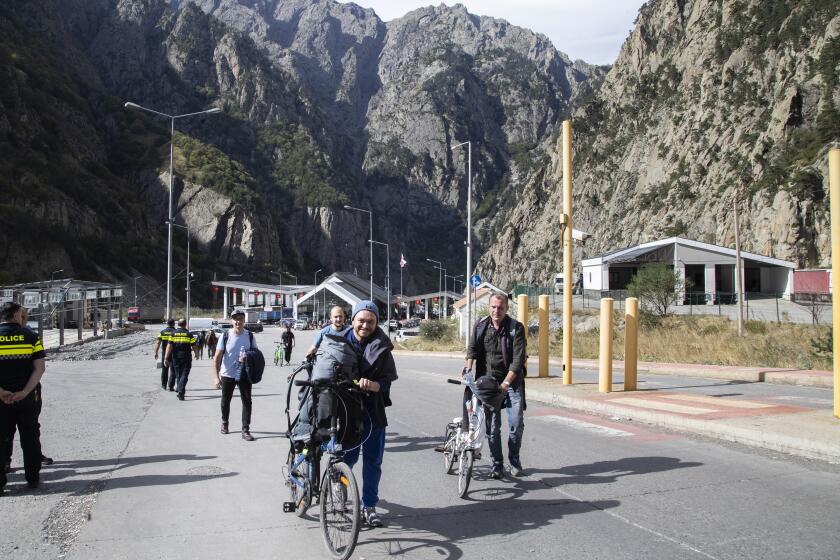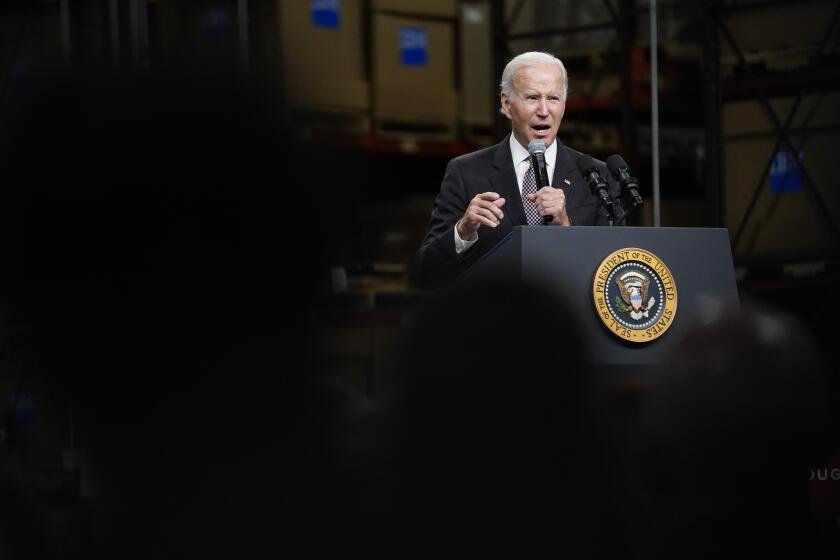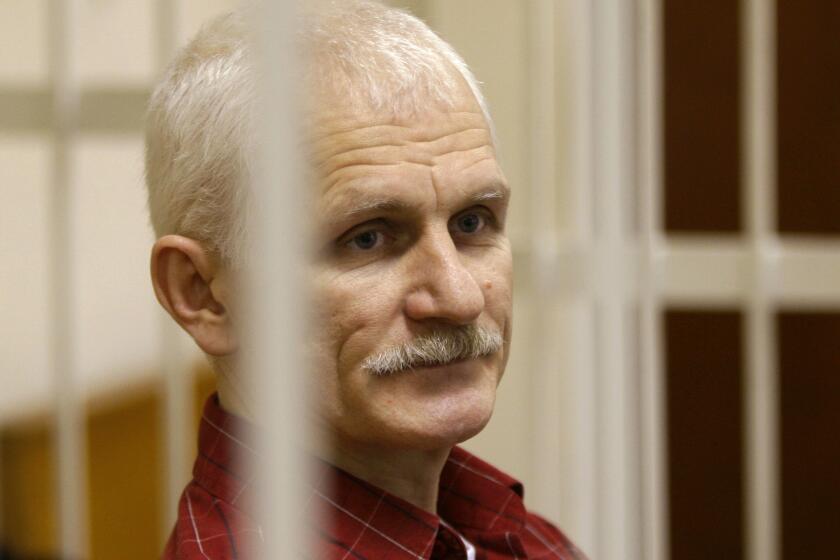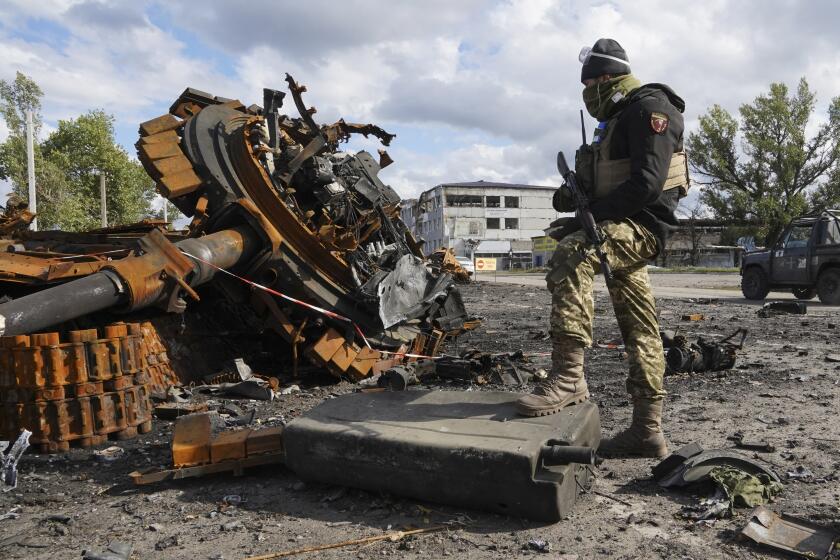After devastating attacks across Ukraine, the Kremlin’s hawks clamor for more
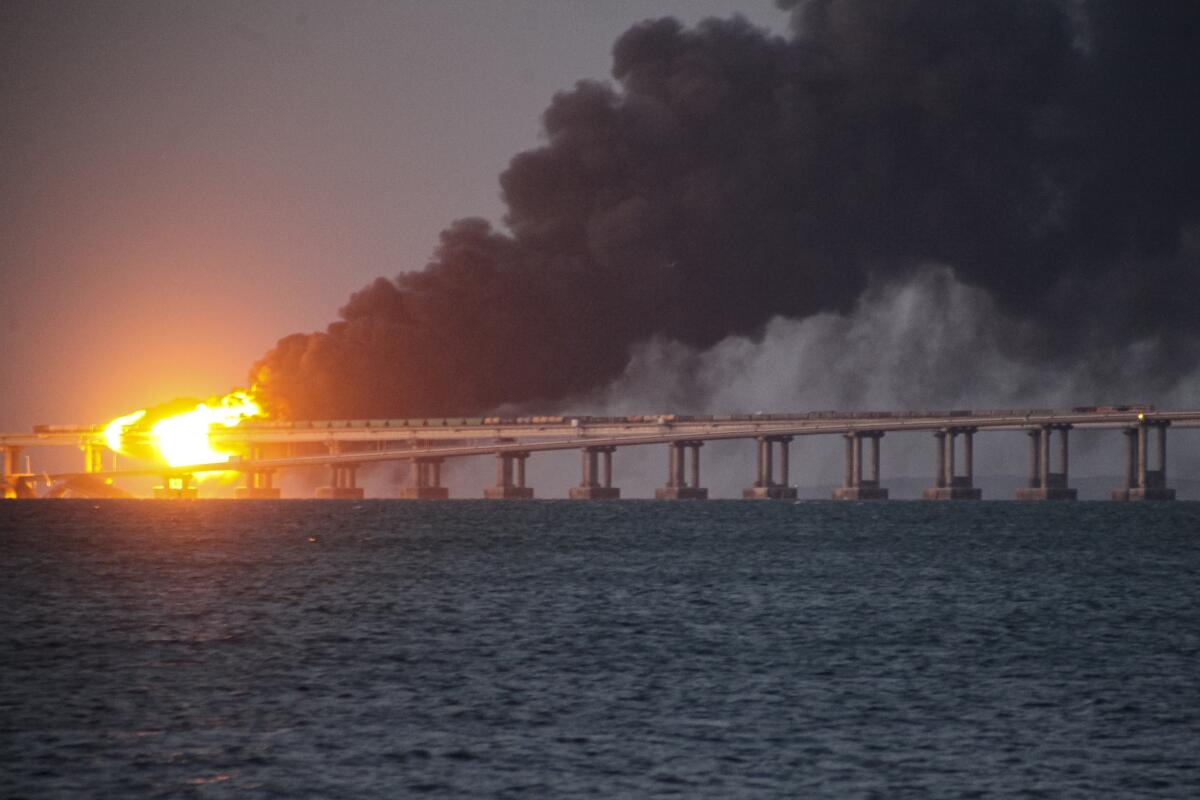
- Share via
TALLINN, Estonia — Moscow’s barrage of missile strikes on cities all across Ukraine has elicited celebratory comments from Russian officials and pro-Kremlin pundits, who in recent weeks have actively criticized the Russian military for a series of embarrassing setbacks on the battlefield.
Russian nationalist commentators and war correspondents in the state media lauded Monday’s large-scale attack as an appropriate, and long-awaited, response to Ukraine’s successful counteroffensive in the northeast and the south and a weekend assault on a key bridge between Russia and Crimea, the prized Black Sea peninsula Moscow annexed in 2014.
Many argued, however, that Russia should keep up the intensity of Monday’s strikes in order to win the war now, with some analysts suggesting that Russian President Vladimir Putin was becoming a hostage of his allies’ views on how the campaign in Ukraine should unfold.
“Putin’s initiative is weakening, and he is becoming more dependent on circumstances and those who are forging the ‘victory’ [in Ukraine] for him,” Tatyana Stanovaya, founder of the independent R.Politik think tank, wrote in an online commentary Monday.
“The fear of defeat is so strong, especially for those who are now fully immersed in this military venture, that Putin’s indecisiveness, with his logic of ‘we have not started anything yet’ and ‘restrained tactics have paid off,’ has become a problem,” Stanovaya said.
Putin’s supporters have been calling for drastic steps on the battlefield for weeks. Those calls intensified over the weekend, shortly after an explosion on the Kerch Bridge linking Crimea to Russia sent shock waves around the globe. The bridge, Europe’s longest, is a prominent symbol of Russian military might and was opened by Putin himself in 2018.
In numbers comparable to the size of Putin’s 300,000-strong mobilization, Russian men are fleeing military call-up. Not everyone welcomes them.
“And?” Margarita Simonyan, head of the state-funded RT television, asked on social media about Moscow’s response to the attack on the bridge.
“This is one of those cases when the country needs to show we can hit back,” wrote Alexander Kots, a war correspondent for Russia’s popular pro-Kremlin tabloid, Komsomolskaya Pravda.
“It is time for fighting! Fiercely, even cruelly. Without looking back at whatever censures from the West,” Sergei Mironov, a senior Russian lawmaker who leads the state-backed party A Just Russia, tweeted Saturday. “There won’t be any bigger sanctions. They won’t say any worse words. We need to do our thing. We started it — we should go till the end. There is no way back. Time to respond!”
The response came Monday morning, with Moscow launching dozens of missiles at Ukrainian cities simultaneously, killing and wounding scores of people and inflicting unprecedented damage on Ukraine’s critical infrastructure. The strikes, which hit 15 Ukrainian cities, most of them regional capitals, knocked out power lines, damaged railway stations and roads, and left cities without water supplies.
The president says the risk of a catastrophic nuclear showdown is at its highest level since the 1962 Cuban missile crisis. Did he say too much?
For the first time in months, Russian missiles exploded in the very heart of Kyiv, the national capital, in dangerous proximity to government buildings.
Putin said Monday that the strikes were in retaliation for what he called Kyiv’s “terrorist” actions targeting the Kerch Bridge, and vowed a “tough” and “proportionate” response should Ukraine carry out further attacks that threaten Russia’s security.
“No one should have any doubts about it,” he said.
“Here comes the response,” RT’s Simonyan tweeted Monday after the attacks. “The Crimean bridge was that very red line from the very beginning.”
The award to human rights advocates in Russia, Ukraine and Belarus comes as Russia’s war in Ukraine is well into its eighth month.
Ramzan Kadyrov, the strongman leader of Chechnya, a Russian region in the North Caucasus, said he was now “100% happy” with how the Kremlin’s “special military operation” in Ukraine was going. He was among the most ardent proponents of “more drastic measures,” even calling for using low-yield nuclear weapons.
The Moscow-installed governor of Crimea, Sergei Aksyonov, described the strikes as “good news.”
The cheering by Kremlin supporters, however, came with demands for Putin and the Russian military to keep up the pace and intensity of the attacks.
Aksyonov stressed that “had such actions to destroy the enemy’s infrastructure been taken every day, then we would have finished everything in May and the Kyiv regime would have been defeated. I hope that now the pace of the operation will not slow down.”
Breaking News
Get breaking news, investigations, analysis and more signature journalism from the Los Angeles Times in your inbox.
You may occasionally receive promotional content from the Los Angeles Times.
RT’s top host, Anton Krasovsky, posted a video of himself dancing on a balcony in a cap with a “Z” on it, a symbol adopted by those in favor of the war, and said in a Telegram post that the damage to Ukraine’s power lines was “not enough! Not enough!”
Another state TV journalist, Andrei Medvedev, called Monday’s attacks “a logical step, which not just the society has long demanded — the military situation demanded a different approach to the hostilities.
“And so it happened. But does it change much?” Medvedev, who works for Russia’s state TV group VGTRK and holds a seat on the Moscow City Council, wrote on Telegram.
“If the strikes on the critical infrastructure become regular, if the strikes on railways, bridges and power plants become part of our tactics, then yes, it does change [the situation]. But for now, according to [official] statements, a decision to plunge Ukraine into medieval times has not been made,” Medvedev wrote.
As Russia’s military performance weakens, a notorious mercenary group, long part of the Ukraine fight, steps into spotlight.
Political analyst Stanovaya noted in a Telegram post Monday that “powerful pressures” have been on Putin “to move onto aggressive actions, massive bombings,” and that prompted him to act.
“As of today, one can say that Putin was persuaded to resort to a more aggressive line. And it corresponds with his understanding [of] the situation. But it is a slippery slope — there is no way back,” Stanovaya said.
More to Read
Sign up for Essential California
The most important California stories and recommendations in your inbox every morning.
You may occasionally receive promotional content from the Los Angeles Times.
